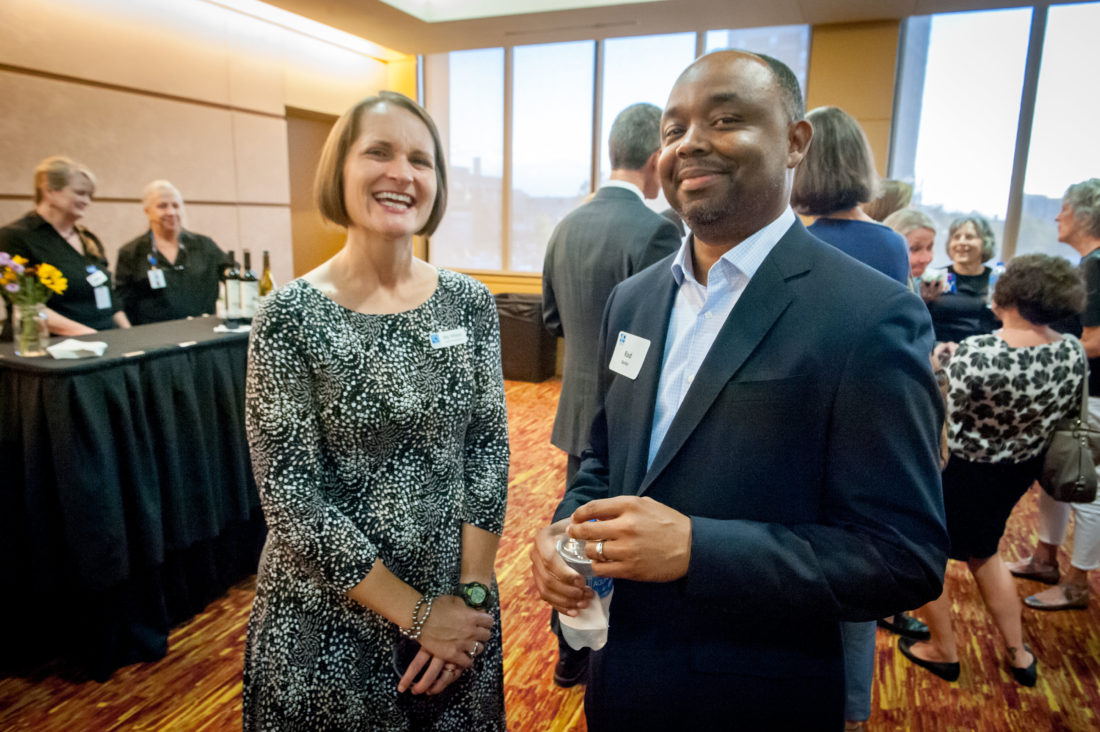Dosty Quarrier, development director for OpenDoors of Asheville, knows her nonprofit got lucky. The organization’s largest annual fundraiser, Art Affair, took place on Feb. 29. The event attracted 400 donors and raised over $250,000 in support for OpenDoors’ mission to end the cycle of poverty through education.
“Honestly, if it had been a week later, I don’t think we would have had that turnout because of COVID,” Quarrier says.
Pisgah Legal Services, on the other hand, wasn’t nearly as lucky. The nonprofit had to cancel its April 2 annual fundraiser, Jazz for Justice, due to Buncombe County’s stay home, stay safe mandate. Meanwhile, plans for its annual fall event, the Justice Forum, remain up in the air. These two happenings, combined with a series of smaller fundraisers, typically generate around $100,000 for the organization, which offers pro bono lawyers and legal services for underserved populations in Western North Carolina.
“That is a big hole for us,” says Ally Wilson, the group’s director of development. “That means it will be harder for us to raise our total annual campaign goal … which gives us flexible funding to sustain all of our programs. We will have to look for different ways to make that up.”
No matter a nonprofit’s fortune or misfortune at the onset of COVID-19, the coming months remain uncertain for all. With mandates limiting crowd sizes and recommended social distancing practices likely the new norm for the foreseeable future, large fundraising events are currently on hold, causing many in the sector to reconsider how they go about connecting with their supporters. And despite the current influx of short-term COVID-related grants, many in the industry also worry about a decrease in available funding later, especially if the economy remains unstable.
“Right now we’re putting out fires,” says Marianne Martinez, executive director of Vecinos, an organization serving and advocating for farmworkers in Western North Carolina. “But this is going to be a long, slow burning fire that we’ll be fighting for a good while.”
Go with the flow
Not surprisingly, many local nonprofits are turning to social media and other online platforms as a way to continue to share their missions, garner support and stay connected to their donors during this period of social isolation.
Campaigns such as Light A Path’s #ConnectionCreatesResilience encourages supporters to post pictures on Facebook and Instagram (often while donning their Light A Path swag) as an opportunity to promote the nonprofit’s efforts to bring yoga, meditation, strength training and running to local disadvantaged youths, the unsheltered and incarcerated populations. According to Caitlin Van Hecke, the organization’s volunteer coordinator, the nonprofit has also launched its own YouTube channel with instructional videos.

Similarly, United Way of Asheville and Buncombe County CEO Dan Leroy recently initiated a weekly video series filmed from his dining room. Leroy’s messages are shared through email as well as the nonprofit’s social media accounts, says Kevin Montgomery, director of resource development. Additionally, the organization has created blog content to highlight its ongoing efforts and partnerships.
Others, such as SeekHealing, which provides free support to people who are recovering from addiction, is preparing for its inaugural online festival, We Are The Medicine, slated to run June 12-14. The virtual, three-day series will feature presentations, storytelling and other activities. The events are free to attend, but donations are encouraged.
“We’re rooting in the moment,” says Michelle Kelly, SeekHealing’s volunteer manager. “We’re working around how things might look for the next six weeks or so. And maybe in six more weeks, we’ll shift our focus again. It’s an opportunity to be flexible and to go with the flow.”
Mixed results
Despite these ongoing efforts, early results and future expectations remain mixed over the benefits of virtual fundraisers. While several organizations noted an influx of online donations in the immediate wake of COVID-19, these same groups report that numbers have since plateaued.
“We’ve definitely seen an increase in online giving, but it’s not enough to cover projected losses,” writes Montgomery in an email exchange with Xpress.
For many, the online model also fails to replicate the social dynamics that occur during in-person meetings. For example, in April, Pisgah Legal Services held its first online version of its bimonthly Justice Matters tour. Prior to COVID-19, the event invited community members inside the nonprofit’s office, where they could speak with the organization’s attorneys and see firsthand the work being done. The latest virtual version took a similar, albeit remote, approach. “I think it worked OK,” says Wilson. “But it’s not the same as being in the space with someone. It’s hard to generate interaction on a Zoom call.”
In general, many of the organizational leaders who spoke with Xpress conveyed reserved optimism about the overall impact that online events and campaigns will have on their nonprofit’s fundraising abilities, especially if COVID-19 flare-ups follow the reopening of businesses, creating additional strain on the local economy.
“If you look at fundraising trends through recessions, it’s typically 6-12 months when you see a dip in individual giving,” says Quarrier. “Maybe we won’t have that problem, but we are preparing ourselves for a potential decline in giving in the next 12 months.”
Rising to the occasion
No matter the future outcome, says Jody Evans, executive director of Asheville Humane Society, COVID-19 has merely intensified what all nonprofits faced prior to the pandemic. “As a nonprofit, your funding model is always a little bit volatile,” she explains. “You’re relying on the goodwill of foundations and the people in your community to support the good work that you do.”
For now, several organizational leaders praise the community’s ongoing support. At the Asheville Humane Society, Evans points to the more than 500 applicants interested in becoming foster parents during the stay home, stay safe mandate. “That’s a silver lining for us,” she says. “To see how people have stepped up, not just monetarily but through giving their time and love to these animals.”

Meanwhile, 17-year-old Connor Mailander recently launched a GoFundMe campaign to help raise money for OpenDoors of Asheville. Currently in training, Mailander intends to run 100 miles on June 19. He will launch the expedition from his South Asheville home and continue along the state’s Mountains-to-Sea Trail. Mailander’s goal is to raise $100,000 to support the nonprofit’s college access program. (To donate, visit avl.mx/754.)
Businesses have also stepped up. In the first two weeks of April, East Fork Pottery raised over $15,000 for Vecinos through a fundraising effort that simultaneously provided free handcrafted mugs to health care workers at Mission Hospital. The unsolicited campaign, says Martinez, “is coming from our vast community of established supporters that are coming back to us and saying, ‘Hey, I’m lucky enough to be in this situation where I’m [financially] stable, but I know there are a lot people that aren’t.’”
Unafraid to ask
But for just how long any given supporter’s financial well-being can withstand the economic impacts of COVID-19 remains unknown. And nonprofits’ approaches to the current uncertainties vary case by case.
Light A Path has opted to pause its fundraising efforts, choosing to skip the recent #GivingTuesdayNow campaign held on May 5. “It felt a little daunting,” says Van Hecke. “We need those funds to keep going … but we just don’t feel like people are in the position necessarily to give us money right now.”
Others, like Pisgah Legal Services, viewed the campaign as a chance to make up for the current financial hole created by its cancellation of Jazz for Justice. Helping to close that gap, Wilson says #GivingTuesdayNow donations exceeded the nonprofit’s goal of $10,000. And further fundraising efforts continue. “Our messaging acknowledges that a lot of people might not be in the same financial space that they were before,” she explains. “So we use language like, ‘If you’re able to,’ or ‘If you can,’ because we do understand that many of our past donors are finding themselves in a different financial situation.”
For Montgomery, past experiences and careers help him navigate the current health crisis. “I’m retired from the military, and I’ve been a fundraising professional for more than 18 years, so I’ve learned a lot about keeping a level head in times of crisis,” he tells Xpress in an email exchange.
And while Montgomery anticipates future challenges due to COVID-19, he remains upbeat. “The test for every fundraising professional is being unafraid to ask and being OK with whatever answer [prospective donors] give you,” he explains. “Most of the time, people will surprise you with their generosity. Already, this crisis has helped to solidify my belief that people naturally want to help others and that the people of Asheville and Buncombe County are incredibly generous and compassionate.”




Before you comment
The comments section is here to provide a platform for civil dialogue on the issues we face together as a local community. Xpress is committed to offering this platform for all voices, but when the tone of the discussion gets nasty or strays off topic, we believe many people choose not to participate. Xpress editors are determined to moderate comments to ensure a constructive interchange is maintained. All comments judged not to be in keeping with the spirit of civil discourse will be removed and repeat violators will be banned. See here for our terms of service. Thank you for being part of this effort to promote respectful discussion.